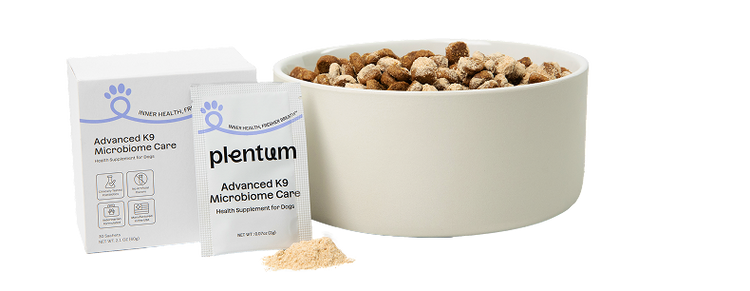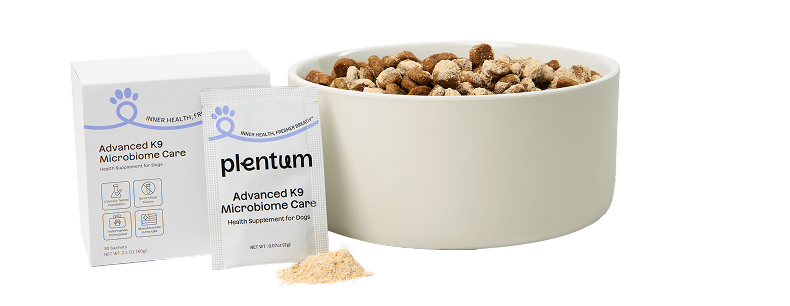Caring for a new puppy is a journey, and it becomes even more challenging when they have a sensitive stomach. A proper routine can establish a gentle yet effective schedule that supports your puppy's developing digestive system. To build a lasting foundation for digestive health and overall wellness, your puppy needs scientifically proven, safe support to develop their microbiome.
Why Puppies Struggle with Sensitive Stomachs
Puppies often face digestive issues that adult dogs typically outgrow. The canine gut microbiome needs the first few months of life to establish itself, as essential bacteria require time to colonize the intestinal tract and achieve adult-like stability. The microbiome is most vulnerable to disruption precisely when it's most critical for development. Studies confirm that puppies establish their own unique intestinal microbial communities, distinct from the patterns seen in adult dogs.
The Immature Microbiome Challenge
Key Scientific Facts:
- The gut microbiome of puppies needs several months to mature into an adult-like state.
- Critical bacterial colonization develops gradually over the first 16 weeks of life.
- Beneficial anaerobic bacteria like Firmicutes and Bacteroidetes take time to establish.
- Digestive enzymes may not be fully developed during the early stages of puppy growth.
Primary Contributing Factors:
-
Maternal Transfer Limitations: Incomplete microbiota inheritance from the mother.
-
Birth Method Impact: C-section versus natural delivery affects initial gut bacteria.
-
Weaning Process: The transition from milk to solid foods is a significant nutritional milestone.
-
Environmental Stressors: Adjusting to a new home and vaccination schedules can cause stress.
-
Natural Development: The microbiome follows a specific timeline for maturation.
Safe Add-ins and Dosages: Veterinary Guidelines
Choosing probiotics for puppies requires careful attention to safety and correct dosage. Veterinary science shows that specific probiotic strains can be given to puppies from their first month of life. Research demonstrates that multi-strain probiotic blends and prebiotic fiber blends are effective in promoting puppy gut health when used correctly.
Probiotic Safety Protocol
Age-Appropriate Dosing (Veterinary Research-Based):
-
8-12 weeks: 1-3 billion CFU daily
-
12-16 weeks: 3-5 billion CFU daily
-
16+ weeks: 5-10 billion CFU daily
Proven Safe Strains for Puppies:
- Lactobacillus johnsonii
- Ligilactobacillus murinus
- Lactobacillus rhamnosus MP01
- Multi-strain formulations are preferred.
Administration Guidelines:
- Give with food to buffer stomach acid.
- Start with an every-other-day dosing plan.
- Observe for 48-72 hours before making any adjustments.
Prebiotic Support (Research-Validated)
Safe Options for Developing Guts:
-
Inulin: Supports the growth of beneficial bacteria.
-
Fructooligosaccharides (FOS): Feeds beneficial lactobacilli.
-
Prebiotic Fiber Blends: Clinically proven for puppies.
- The recommended starting dose should be about ¼ of the adult dose, increased gradually.
Avoid Until 6+ Months:
- High-concentration fiber supplements
- Adult-strength digestive enzymes
- Unproven herbal remedies
- Daily Schedule: Your Puppy's Gut-Friendly Routine
A consistent daily routine is crucial for supporting your puppy's sensitive digestive system. A gentle morning protocol and a calming evening routine help regulate digestion and reduce stress.
Morning Protocol (7:00-9:00 AM)
Step-by-Step Process:
-
Fresh Water: Ensure room temperature water is always available.
-
Probiotics: Administer 30 minutes before their first meal.
-
Portion Control: Divide the daily food amount into three to four small meals.
-
Gentle Belly Massage: 5-10 minutes in a clockwise motion.
-
Post-Meal Monitoring: Watch your puppy for 30 minutes after eating for any signs of discomfort.
Feeding Schedule Guidelines:
-
Young Puppies (8-12 weeks): 4 meals daily.
-
Older Puppies (12-16 weeks): 3 meals daily.
-
Consistent Timing: Feed at the same times every day.
Evening Protocol (5:00-7:00 PM)
Dinner Routine:
- The last meal should be 2-3 hours before bedtime.
- Give evening supplements (like prebiotics) with dinner.
- Create a calm, low-stimulation environment during meals.
- Remove the water bowl one hour before bedtime to prepare for the night.
Recommended: Plentum's Advanced K9 Microbiome Care
For complete microbiome support, consider Plentum's Advanced K9 Microbiome Care, which uses scientific methods to promote canine gut health. This supplement contains a synergistic blend of probiotics, prebiotics, and postbiotics to support the developing microbiome in puppies. What sets Plentum's formula apart is its targeted approach to modulating gut microbiome composition without disrupting the overall bacterial equilibrium.
Key Features:
- Contains scientifically developed ingredients to support the digestive system.
- Triple-action formula combines Probiotics, Prebiotics, and Postbiotics.
- Features age-specific concentrations to support the puppy microbiome.
- Veterinarian-developed to meet the requirements for maintaining gut health balance.
When to Adjust or See a Veterinarian
While most puppies experience mild digestive sensitivity, certain symptoms require immediate veterinary attention. Monitor your puppy's response to their new routine carefully, looking for both positive signs and concerning changes.
Immediate Veterinary Attention Needed
Red Flag Symptoms (Call Vet Within 24 Hours):
- Persistent vomiting lasting >24 hours
- Bloody or severely watery diarrhea
- Signs of dehydration (dry gums, lethargy)
- Complete loss of appetite for more than one day
- Failure to urinate or defecate
- Chronic Issues Requiring Professional Evaluation
Consult your vet if you notice:
- Symptoms persisting for more than 3 weeks
- Failure to thrive or poor weight gain
- Behavioral changes accompanying digestive symptoms
- Recurring digestive episodes
Routine Adjustment Indicators
Positive Response Signs:
- Formed, consistent stools
- Steady, age-appropriate weight gain
- Good energy levels and appetite
- Normal, playful behavior
When to Modify Protocol:
- Symptoms worsen after 3-7 days on the new routine.
- New digestive issues develop.
- The puppy shows an aversion to food.
- Unusual lethargy or discomfort.
Safe Adjustment Steps:
- Return to the basic feeding protocol.
- Discontinue supplements temporarily.
- Document all symptoms and their timing.
- Consult your veterinary team for guidance.
This guide draws information from veterinary research studies, AAHA Canine Life Stage Guidelines, ACVIM consensus statements, and clinical nutrition research. Always consult your veterinarian for specific recommendations regarding your puppy's care.
References:
-
https://pmc.ncbi.nlm.nih.gov/articles/PMC9478664/
-
https://pmc.ncbi.nlm.nih.gov/articles/PMC8222291/
-
https://www.mdpi.com/2076-2615/13/4/578/pdf?version=1675700746
-
https://pmc.ncbi.nlm.nih.gov/articles/PMC9951692/
-
https://www.frontiersin.org/articles/10.3389/fvets.2019.00498/pdf
-
https://pmc.ncbi.nlm.nih.gov/articles/PMC7199667/










